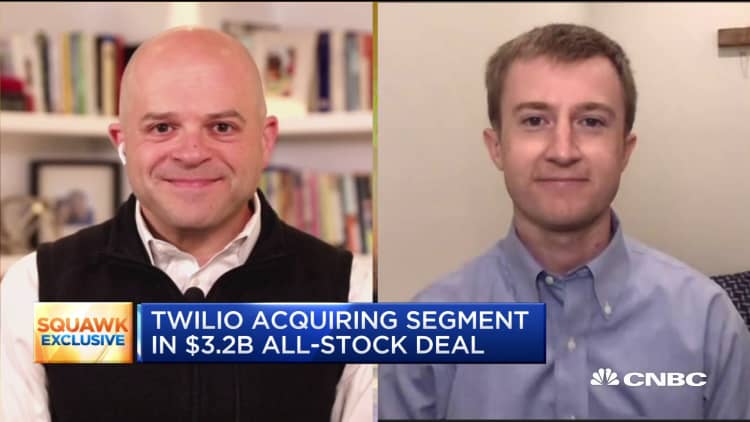Infrastructure company Segment — known for managing the customer data of huge brands from IBM to Glossier — was acquired by cloud communications provider Twilio for $3.2 billion in stock in November.
But less than a decade ago, Segment founders Peter Reinhardt, Calvin French-Owen and Ilya Volodarsky were college kids at Massachusetts Institute of Technology (MIT), living in the same dorm and brainstorming products they could build to launch their own start-up.
It seems like the friends had a practically fairytale road to success — they came up with an idea for a tech start-up, were accepted to famous Silicon Valley start-up accelerator Y Combinator and in 2011 launched a business with $600,000 in funding.
Still, not everything went as planned. Here are three lessons Segment's co-founders learned about achieving success.
Always ask for what you want
Reinhardt, French-Owen and Volodarksy didn't start out dreaming of being entrepreneurs. In fact, before MIT, the friends didn't know much about start-up culture. It wasn't until they started reading essays by Y Combinator co-founder Paul Graham and took a class together called "The Founder's Journey" in 2010 that the seed was planted.
And it wasn't until they took an embarrassing risk that the dream seemed like it could be a reality.
Each week in their MIT "Founder's Journey" class, the founder of a successful start-up would speak and answer students' questions. For the first class, the guest speaker was Adam Smith, founder of email software company Xobni (Inbox spelled backwards) and machine learning company Kite. Reinhardt, French-Owen and Volodarsky were "totally in awe" of Smith, who also attended MIT (and graduated in two-and-a-half years, according to his LinkedIn profile) and founded Xobni at Y Combinator in 2006.
Hearing from Smith left Reinhardt, French-Owen and Volodarsky "totally floored," Reinhardt says. "It was so amazing meeting an amazing founder."
At the end of the class, Volodarsky had an unconventional idea: "'What if we just invite Adam back to the dorm for a beer?'" Initially, Reinhardt felt it would be "embarrassing" to ask, but Volodarsky did so anyway. To the friends' surprise, Smith said yes.
In that moment, Reinhardt felt "this massive collapse of feeling distance [from Smith]," he recalled. "It's like, 'Wow, a founder is a normal person too. They do normal things. And maybe we could actually be founders.'"
Behind every success is failure
After their perspective-changing meeting Smith, Reinhardt, French-Owen and Volodarsky spent the rest of the school year trying to build products with which they could start a company. By the spring of 2011, the friends had landed on the idea for a "classroom lecture tool" that would let students flag any points of confusion to professors. They called it Segment and applied to Y Combinator.
The co-founders got accepted. "That was a big moment for us," Reinhardt says.
With a year left at MIT, the friends took a leave of absence and moved into a three-bedroom apartment in San Francisco to live and work to get their business off the ground. Reinhardt became CEO; French-Owen, CTO; Volodarsky, president; and they brought on another friend, Ian Storm Taylor, a student at the Rhode Island School of Design, to be lead designer.
But despite about $600,000 in seed money from Y Combinator's angel investors and the team's singular focus, after they launched the lecture tool that fall, it failed. Students didn't use the product as intended — once they got onto their computers, they started surfing the internet and were distracted from the lecture.
"It was pretty obvious that it was not going to work. So, we shut it down and called back all the investors," Reinhardt says.
In fact, "Y Combinator let us find out recently that they actually didn't think much of the idea, but thought we were a good team," Reinhardt says. As a result, the co-founders were able to retain all but two investors.
Between fall 2011 and winter 2012, the co-founders worked 80 to 100 hours a week creating a new product for Segment — a web analytics tool for companies to better understand their customers' behavior.
But "that was also a disaster," Reinhardt says. "Turns out it's a very, very crowded market."
"We were a year and a half in. We had $100,000 left in the bank. We realized that we had one more shot," says Reinhardt.

Your intuition may be 'completely wrong' – get feedback
Taking what could be their last chance with the money they had left, the co-founders paused and started to reflect on what they were taught at Y Combinator. They decided to focus on "building something for uses that we could test quickly," Reinhardt says.
With all but two investors still on board, the team decided to release a version of the internal programming tool they had created build their previous products, which they had called Analytics.js. Analytics.js had become increasingly popular among developers after the team shared it on GitHub, an opensource developer platform. After noticing how it was being used, Taylor recommended they take it commercial and make that Segment's product.
"Ian was like, 'You know what, I think there's a big business behind Analytics.js and I think we should do that instead,'" Reinhardt says. Taylor told the team they should adjust their programming tool and create a simple analytics Application Programming Interface, or API, that could be used to collect analytics data from any platform.
At first, Reinhardt completely disagreed with Taylor and felt it was "the worst idea of all time," he says. "I didn't think there was much value in it. So, we had a huge fight, all four of us founders."
"We were in a pretty downward spiral at that point. We had six or eight months of runway. We were pretty close to a death spiral at that point," Reinhardt says.
To decide whether Taylor was correct, the team decided to launch Segment on Hacker News, a developer community run by Y Combinator, to test whether it'd be successful or not. To Reinhardt's surprise, thousands of people were interested in the product and many reached out "demanding" access to it, he says.
"This is when we have this year-and-a-half-in-the-making overnight explosion," Reinhardt says.
"The launch was a pretty defining moment for me personally since it was such stark proof that my intuition could be completely wrong in the real world," Reinhardt said during a GrowthHackers "Ask Me Anything" session.
And it wasn't the last time the team considered feedback. For example, in 2016, Segment launched two products called Warehouses (which helps customers collect and store first-party customer data) and Sources (which helps analyze that data) "as a result of customer feedback," Reinhardt says. The products "quadrupled revenue," according to Reinhardt.
"That's the sort of clarity that you only get by talking to customers. You don't get that by trying to be intuitive," he said.
By 2019, the company had raised $284 million in venture capital funding and was bringing in "tens of millions of dollars in annual revenue," Reinhardt told the San Francisco Business Times in January 2019.
Segment is now a division of Twilio and will continue to be led by Segment CEO Reinhardt, according to Twilio.
Don't miss: Chase Sapphire Preferred is offering a massive 80,000-point bonus for a limited time

This story has been updated to reflect that Twilio's acquisition of Segment was completed on Nov. 2, according to Twilio.


